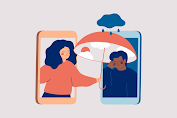Empathise to Evolve
This
is one of the very insightful articles, I got to read.
“Years ago, the anthropologist
Margaret Mead was asked by a student what she considered to be the first sign
of civilization in a culture. The
student expected Mead to talk about clay pots, tools for hunting, grinding
stones, or religious artifacts. Whereas Mead said that the first evidence of
civilization was a 15,000-year-old fractured femur found in an archaeological
site. A femur is the longest bone in the body, linking hip to knee. In
societies without the benefits of modern medicine, it takes about six weeks of
rest for a fractured femur to heal. This particular bone had been broken and
had healed. Mead explained that in the animal kingdom, if you break your leg,
you die. You cannot run from danger; you cannot drink or hunt for food. Wounded
in this way, you are meat for your predators. No creature survives a broken leg
long enough for the bone to heal. You are eaten first. A broken femur that has
healed is evidence that another person has taken time to stay with the fallen,
has bound up the wound, has carried the person to safety and has tended them
through recovery. A healed femur indicates that someone has helped a fellow
human, rather than abandoning them to save their own life.”
This is a clear indicator of how the
human race, has evolved due to empathy, making it the strongest living species
on the planet.
Now, let's take this into context to
see how we are evolving further in this direction.
Please hear me clear. I said empathise
and not sympathise. While sympathising, is about feeling sorry for someone and
doing what you could to help them, Empathising is about trying to understand
someone and being sensitive to them.
So, how can we become more empathetic?
One good method to understand and empathise with others, is to just mentally and emotionally swap roles, with the person you would like to empathise with and see how you would think and feel. For example, when you are driving a car, think of yourself as being the pedestrian on the road. How irritable would you feel to hear the honking of the car? How unsafe would you feel when someone speeds through and overtakes you? How much of discomfort would you experience, when you must push up your speed, to cope up with a fellow commuter, to just stay safe on the road?
While this may be an easy to relate
example, it may still be difficult to understand what is beyond our experience.
For instance, we might not be able to relate to the physical or psychological
experience of a Transgender or Gay. Similarly, we might condemn a beggar or
prostitute, but we don't know where they come from and what has put them into
such a situation.
So, the first step to empathise is to
drop all judgements and genuinely take interest in understanding someone. There
is a good chance we can get to know them better, by having a deeper
conversation, with an open mind and by being in a listening mode.
For instance, I was averse to the
sight of transgenders, but once I had the opportunity to interact with them and
understand their side of the story. I could understand the many practical
difficulties they face, in terms of not being to get a job, finding a place to
live and the social shame that excludes them not just from the society but
their own family too. This helped me to gain a different perspective, which I
had not had before.
Similarly, we can try this exercise with
different segments of people, who we find it difficult to understand. It could
be a street vendor, a garbage picker, a prostitute, a beggar, a physically
challenged person, a visually impaired person, and so on. Through empathetic listening
we will understand. It will help us widen our perspectives and broaden our minds.
Once we understand, it will be easier for us to empathise, rather than just
sympathise. This will result in us being more sensitive to them and act accordingly.
D. Senthil Kannan,
%20Ltd..png)




%20Ltd.-1.png)


%20Ltd..png)
No comments:
Post a Comment